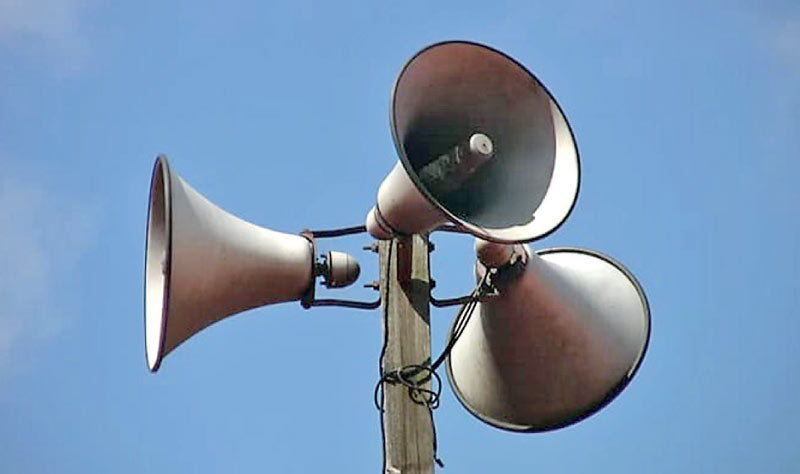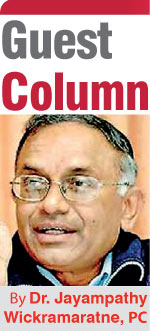Saturday Feb 14, 2026
Saturday Feb 14, 2026
Thursday, 20 February 2025 00:00 - - {{hitsCtrl.values.hits}}

One of the main reasons for the continuing noise pollution via loudspeakers is Police inaction
|
 Noise pollution laws in other countries
Noise pollution laws in other countries
The handful of tourists who enjoy loud noise come from countries where laws on noise pollution are very strict. In their home countries, can they make noise that affects others even during the daytime?
In ‘Re Noise Pollution’, Chief Justice Lahoti referred to laws on noise pollution in several other jurisdictions.
In the United Kingdom, the Noise Abatement Act provides that loudspeakers should not be operated between 9 p.m. and 8 a.m. for any purpose and at any other time for advertisement, entertainment, trade, or business. The Noise Act of 1996 makes provision about noise emitted from dwellings at night, about the forfeiture and confiscation of equipment used to make noise unlawfully, and for connected purposes.
In the United States, Congress has declared in the Public Health and Welfare Act that it is the policy of the United States to promote an environment for all Americans free from noise that jeopardises their health or welfare. For regulating noise caused by announcements through the use of loudspeakers and noise emitted during the nighttime operation of bars and restaurants, local governments shall take measures necessary to protect the living environment, including restrictions on operating hours, in accordance with the local physical and social conditions.
In China, the Law on Prevention and Control of Pollution from Environmental Noise has been enacted to prevent and control environmental noise pollution, protect and improve the living environment, ensure human health, and promote economic and social development. For purposes of this law, “environmental noise” means sound that is emitted during the course of industrial production, construction, transportation, and social activities and that impairs the living environment of the neighbourhood.
The Indian Supreme Court, in Church of God (Full Gospel) in ‘India v. K.K.R. Majestic Colony Welfare Assn.’, held that the Court may issue directions regarding controlling noise pollution that was a direct result of and was connected with religious activities. Justice Shah stated what is well to remember: “Undisputedly, no religion prescribes that prayers should be performed by disturbing the peace of others nor does it preach that they should be through voice amplifiers or beating of drums. In our view, in a civilised society in the name of religion, activities which disturb old or infirm persons, students or children having their sleep in the early hours or during daytime or other persons carrying on other activities cannot be permitted.
“It should not be forgotten that young babies in the neighbourhood are also entitled to enjoy their natural right [to sleep] in a peaceful atmosphere. A student preparing for his examination is entitled to concentrate on his studies without [him] being unnecessarily [disturbed] by the neighbours. Similarly, the old and the infirm are entitled to enjoy reasonable quietness during their leisure hours without there being any nuisance of noise pollution. Aged, sick, people afflicted with psychic disturbances as well as children up to 6 years of age are considered to be very sensitive to noise. Their rights are also required to be honoured.”
Indian courts have continued the trend set by Judges such as Chief Justice Lohati and Justice Shah.
In the 2020 case of ‘Afzal Ansari v State of U.P.’, the issues that arose were whether prohibiting or restricting the recitation of ‘azan’ (call to prayer) through sound-amplifying devices during the COVID-19 crisis was violative of Article 25 (Freedom of conscience and free profession, practice and propagation of religion) and whether such recitals violate order or guidelines issued by the state. The Allahabad High Court held: “[W]e are of the considered opinion that azan can be recited by ‘muezzin’ from minarets of the mosques by human voice without using any amplifying device and the administration is directed not to cause hindrance in the same on the pretext of the guidelines to contain the pandemic Covid19, but its recitation through loudspeakers or other sound-amplifying devices cannot be said to be an integral part of the religion.”
Last month, in ‘Jaago Nehru Nagar Residents Welfare Association v. Commissioner of Police’, the Bombay High Court emphasised that using loudspeakers for prayers or religious discourses is not an essential part of any religion. It clarified that such practices are not protected under Article 25 of the Constitution, which guarantees the freedom to practice religion. The Court stressed that noise pollution poses significant health hazards. Allowing the unrestricted use of loudspeakers would infringe on the rights of residents living nearby, the High Court held, thus prioritising public interest and health over the claimed religious rights associated with loudspeaker use.
Justice Samayawardhena Committee report
In 2023, the Minister of Justice appointed a committee chaired by Justice Mahinda Samayawardhena, Judge of the Supreme Court, to review laws and regulations related to noise pollution in Sri Lanka to bring them on par with global standard setting. Members included Parinda Ranasinghe, the present Attorney-General, Director General of the Central Environmental Authority and the Deputy Inspector General of Police (Legal). The committee submitted its report in March 2024. It reviewed existing laws and regulations and draft regulations on noise emission prepared by the Ministry of Environment. The committee also referred to global standards and internationally accepted best practices. The committee’s recommendations cover varied forms of noise emission.
The committee stated that over the past decade, there has been a significant surge in environmental concerns, particularly regarding the escalating crises impacting our climate and, as a result, the state of human life itself. The World Health Organization states that excessive noise endangers human health by increasing the risk of diseases such as ischemic heart disease, hypertension, sleep disturbance, hearing impairment, tinnitus, cognitive impairment, adverse birth outcomes and mental health problems. According to the National Geographic Society, noise pollution affects animals’ ability to survive as they use sound to navigate, find food, attract mates, and avoid predators.
The committee was of the view that noise pollution laws and regulations in the country should be on par with international standards. The most important recommendation of the Justice Samayawardhena Committee relevant to our discussion is that noise pollution in Sri Lanka should primarily be regulated in accordance with the directions issued by the Supreme Court in ‘Ashik v. Bandula’.
Police inaction
One of the main reasons for the continuing noise pollution via loudspeakers is Police inaction. The Facebook page of the National Coalition Against Noise Pollution is replete with posts giving instances of inaction by the Police. Interactions with Police personnel show that they have not been adequately briefed on the judgment of the Supreme Court and their own IGP’s circulars. A typical response when a complaint is made is that the organisers of the event causing noise would be asked to ‘reduce’ the sound. That the judgment and the circulars require that noise emitted should not extend beyond the precincts of the particular premises is not known to almost all officers. Police are extremely reluctant to seize equipment and report the matter to a court as required by the Supreme Court judgment when a permit holder does not heed a warning not to violate the conditions of a loudspeaker permit.
The Weligama Police need to be congratulated for taking action against the disco owners who violated the conditions of the permit. It is interesting to note that Ashik v. Bandula also resulted from the refusal of the Assistant Superintendent of Police, Weligama Police, himself a Muslim as the Supreme Court observed, to issue a loudspeaker permit to a mosque due to complaints that there was excessive noise from mosques. Soon after the Weligama incident, Acting IGP Priyantha Weerasinghe instructed the Kiribathgoda Police to order the Kiribathgoda United Traders Association to desist using loudspeakers to advertise their businesses, causing inconvenience to residents of the area. This followed complaints by the Viharadhipathi of the local temple and residents. One hopes that these instances are not isolated and that the Police will follow the Supreme Court judgment and the IGP’s circulars to the letter.
Victims of noise pollution and everyone concerned to ensure a clean environment will surely hope that saner counsel will prevail and that the Government will not attempt to change the status quo, which is based on a Supreme Court judgment that has been widely welcomed and is in consonance with international best practices. Any such change will violate the fundamental rights to equality and equal protection of the law guaranteed by Article 12(1) of the Constitution and the freedom from cruel, inhuman or degrading treatment guaranteed by Article 11.

Part I of this article can be seen at https://www.ft.lk/columns/Clean-Sri-Lanka-and-noise-pollution-Part-I/4-773219